
AI and the Future of Work: What’s Changing and How to Stay Ahead
Artificial Intelligence (AI) isn’t a futuristic fantasy—it’s here, and it’s reshaping industries at an unprecedented pace. While AI promises efficiency and innovation, it also raises concerns about job security. Will AI replace you? Which jobs are most at risk? More importantly, how can you adapt?
A Pattern of Progress
Historically, technology has always disrupted the workforce. The Industrial Revolution replaced skilled artisans with machines, but it also created factory jobs. The rise of computers eliminated roles like typists while opening doors in IT. AI follows the same pattern—automating repetitive tasks while creating demand for new skills.
Unlike past technological shifts, AI is evolving exponentially. The global AI market is expected to grow from $279 billion in 2024 to $1.81 trillion by 2030. That kind of transformation will change industries faster than ever before.
Jobs at Risk: Who Should Be Concerned?
AI thrives on automation, which puts some roles in danger. The most vulnerable jobs include:
- Administrative and Clerical Work: AI tools like OCR and scheduling assistants are reducing the need for human data entry and coordination.
- Customer Service: AI chatbots now handle most routine inquiries, making traditional call center jobs less necessary.
- Financial Analysts and Accountants: AI can analyze massive datasets and predict trends faster than humans, reducing the need for manual financial analysis.
- Retail Workers and Cashiers: Self-checkout and AI-powered inventory systems are cutting down traditional retail roles.
- Transportation and Logistics: Autonomous delivery systems, drones, and self-driving trucks threaten jobs in shipping and transportation.
Adapting to the AI Shift
AI isn’t replacing humans entirely—it’s changing the skills that matter. Here’s how to stay ahead:
- Understand AI Basics: Knowing how AI works (even at a high level) makes you more adaptable. Platforms like Coursera and Udemy offer beginner-friendly courses.
- Develop Data Skills: AI runs on data. Learning tools like Excel, SQL, or Power BI can make you valuable in any industry.
- Strengthen Soft Skills: AI can process information, but creativity, emotional intelligence, and critical thinking remain human strengths.
- Embrace Continuous Learning: AI is evolving fast, so staying updated is key. Look for workshops, certifications, and online courses.
- Leverage No-Code AI Tools: Platforms like DataRobot or H2O.ai allow non-programmers to use AI, making it accessible to everyone.
AI is Creating Jobs Too
Despite fears of job losses, AI is also generating new opportunities. The World Economic Forum predicts 97 million AI-driven jobs by 2025. Roles in AI ethics, data science, and human-AI collaboration will be in demand.
Final Thoughts
AI won’t replace workers—it will reshape work. The key to job security is adaptability. By learning how to work with AI rather than against it, you can future-proof your career.
Are you ready for the AI-powered future? Let’s talk in the comments!
